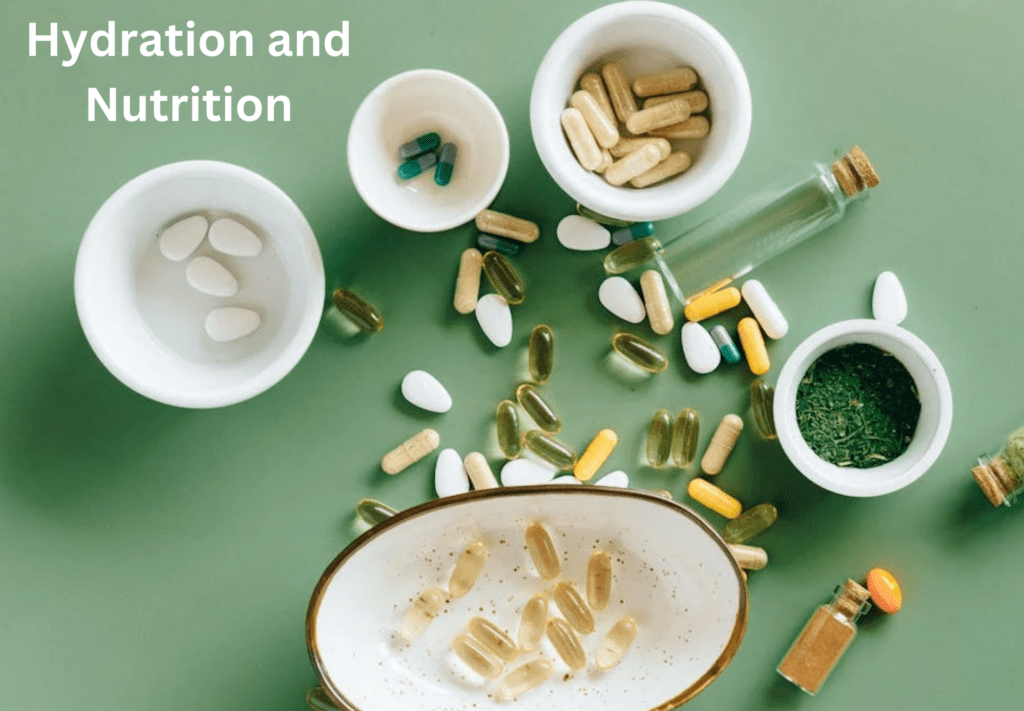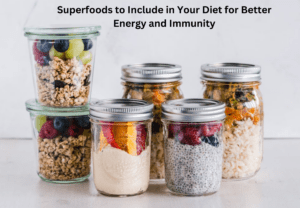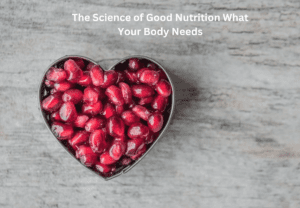Nutrition, a term well-known yet, what does it mean? Nutrition can provide the body’s system with all the needed nutrients to assist in the proper performance and functions of the body’s growth and development. Whether you’re interested in fueling your body to keep you at and reaching a healthy weight or just feeling your best, getting a primary education on nutrition principles is an excellent place to start. Now, let’s learn more about this ultimate guide that will get you off on the right track on your journey to being the healthier you.
What are nutrients?
Nutrients are the building blocks of life. These are contained within your food and needed by your body for its vital functions. Stated, nutrients can be divided into two principal heads: macronutrients and micronutrients:
1. Macronutrients
These are the nutrients that your body requires in more significant amounts :
- Carbs: This is the fuel of the body. Carbs make up that bread and pasta, fruits and veggies, and what fuel from that morning jog to those late-night Netflix binges.
- Proteins: for building and repairing tissues. Lean meats, beans, nuts, and dairy are some of your primary protein sources.
- Fats: Your body needs fat! Healthy fats are avocados, nuts, and fish that help your body absorb vitamins and keep your brain healthy.
2. Micronutrients
These vitamins and minerals are required in lesser amounts but are equally important.
- Vitamins: From Vitamin C for immunity to Vitamin D for bone health, vitamins keep your body working correctly.
- Minerals: Calcium for strong bones, iron for healthy blood. Minerals help keep the body’s engine running like a finely-tuned machine.
Why Nutrition Matters
Have you ever asked why people are being taught that nutrition is important at all? Well, here is why.
There is a proximity between your nutrition and health as well as wellness. That’s why:
- Energy Levels: The nutrients keep the body charged during the day.
- Disease Prevention: A balanced diet lowers your chronic disease risk factors for diabetes, heart disease, and obesity.
- Mental Health: Believe it or not, what you eat could be connected to your mood or mental acuity. Omega-3- 3 fatty acids have been linked to the support of brain health. Know A Balanced Diet
A balanced diet does not mean salad 24/7. Think variety and moderation. Here’s a simple breakdown of what should go on your plate:
- Half of it is fruits and veggies. Imagine colors!
- One-quarter of it is whole grains such as brown rice, quinoa, or whole grain bread.
- One-quarter is lean proteins like chicken, fish, tofu, or beans.
And, of course, remember good fats and plenty of water to fill in all the rest!
Tips for Healthy Choices
Healthy nutrition can’t be intimidating. As easy as it gets, it might become your new routine. Just try doing the following with ease:
- Pay attention to labels: Practice reading labels for hidden sugars, sodium, and unhealthy fats.
- Think Ahead: Meal planning often protects you from having the free time to fix something that tastes bad for you to stick you to healthy options
- Snack Smart: Add potato chips and candy to your snack box with nuts, yogurt, or fruit.
- Listen to Your Body: Determine between true hunger and emotional eating.
Nutrition Myths: Pop Busted.
Before We’re Done, Let’s Deflate These Common Misconceptions
- Myth: Fats are the Enemy
- Fact: The healthy fats are not going to harm you. Neither will they make you grow if you eat that stuff in moderation.
- Myth: Carbs are bad
Fact: The good carbs, like oats and fruits, feed and power your body.
- Myth: Skipping meals helps in losing weight
Reality: Skipping meals will starve you. Your metabolism will then decrease, and you tend to eat the most.
Acting Step: Steps for You to Improve Your Nutrition
You now have some idea of nutrition. Well, and good to know, but it is now time to put it into practice. Here are a couple of steps that will integrate healthy eating habits into everyday life:
1. Make It Small
Please do not turn your diet overnight-it’s impossible physically. Start incorporating one or two changes at a time each week. Such as:
- Replacing soda with drinking water or herbal tea
- Other increasing fruits in your diet
Healthy changes are being made with minimum daily changes
2. Portion Control
Healthy foods turn bad if used excessively. To facilitate this, one can make use of visual portions. They include:
Number of carbohydrates
Number of proteins equivalent to the palm’s size
One-quarter of fats are butter and oils equal to thumb
Mindful eating-take notice of the volume of what you are eating and how full you are so you don’t end up overeating
3. Test the Kitchen
Healthy eating is not boring. Try new recipes and experiment with herbs and spices to add flavor without adding calories. For now, some examples are roasted vegetables with garlic and paprika flavor, overnight oats with fruits and honey drizzle, or grilled fish, squeezed lemon topped with quinoa.
Prep at home tells you what exactly is being put in the cooking, making it much easier to track nutritional goals.

Hydration and Nutrition
Hydration equals food for most of us. Hydration has much significance in health. It helps maintain body temperature. This, in turn, aids in digestion. It is indispensable in the performance of cognitive functions. This is how one is hydrated.
- drink at least 8-10 glasses of water daily, especially if you are active; • carry a refillable water bottle to make drinking hydrate throughout the day
- hydrate using foods such as cucumbers, watermelon, oranges.
Other fluids like tea and coffee count towards hydration and should not be abused,
but sweet drinks with booze. Healthy Eating in Social Situations
Healthy eating in social situations indeed may be challenging. Still, it can very quickly be done with a bit of planning:
At parties: Enjoy your favorite treats in small portions, and get full-on healthy options or lean proteins.
Eating out: Go for grilled rather than fried, and don’t be afraid to ask them for dressings or sauces
Traveling: Pack your nuts, fruits, whole grain crackers, or avoid fast food.
The key is moderation, indulge in the festivity without remorse, but not to the point of nullifying all the great work.
Track Your Progress
Tracking everything you put into your body will identify trends and areas that need improvement and help keep the motivation toward the behavior. Some of the options may include
Use a food diary, which tracks meals and snacks
Some apps enable calorie tracking and nutrient monitoring.
A diary to record moods that have developed over the consumption of various foods.
Do not let perfection become your Enemy. You are okay now, standing out here, and you do not worry about everything. When to See a Pro
While the general overall nutrition guidelines are all good, no two bodies are alike. If you have any health issues, needs, limitations, and unique goals for your fitness, you could work out in more detail, specifically with a registered dietitian or nutritionist. You can even tailor your program.
Celebrate Your Wins
Celebrate your little wins. That celebration could be a healthy snack, a healthy-cooked meal, or proper hydration. Rewards do not have to be food. A warm bath, a new book, or a fitness class will complete the job.
Conclusion
Nutrition is the journey, not the destination. Basic knowledge, consciousness, and consistency will form a foundation for great habits of nourishment in the body, mind, and soul.
And bon appétit, mostly! Alright, and most importantly: do not forget that there’s such a thing called the balance notion of healthy living. This marks where your lifetime of superior nutrition and wellness is starting. You are set to roll!
FAQs
Here is a list of general nutrition questions that will dispel many questions and issues.
1. What is the most critical aspect of nutrition?
All nutrients—carbohydrates, proteins, fats, vitamins, and minerals—help health. However, balance and variety are problematic. Consuming various nutrient-dense foods is the best way to ensure that your body has everything it needs.
2. How much should I drink each day?
A rough general rule of thumb is to consume 8-10 glasses (2-2.5 liters) of fluid daily. That depends on activity level, climate and personal needs. However, pay attention to your body and drink when thirsty. Remember that food, including fruits and vegetables, is part of your fluid intake.
3. What’s the difference between simple and complex carbs?
- Easy carbs, sugar, and white bread cause quick spikes in energy that die off very fast.
- Tough carbs are grains and beans, and vegetables take even so long to be assimilated; hence, they are one of the sources of sustained energy from among the nutrition benefits.
Nutrition advantages complex carbohydrates For more sustained energy
4. Are All fats Bad?
Not! Healthy fats in avocados, nuts, seeds, and fish support your brain, help to regulate hormones, and even facilitate nutrient absorption.
5. Does skipping breakfast harm you?
Skipping breakfast is not bad for everyone, but it can make a person tired or cause them to overeat at other times. In a few others, missing breakfast has adverse effects, mainly when the food consumed during the remaining meals lacks all the essential nutrients.




